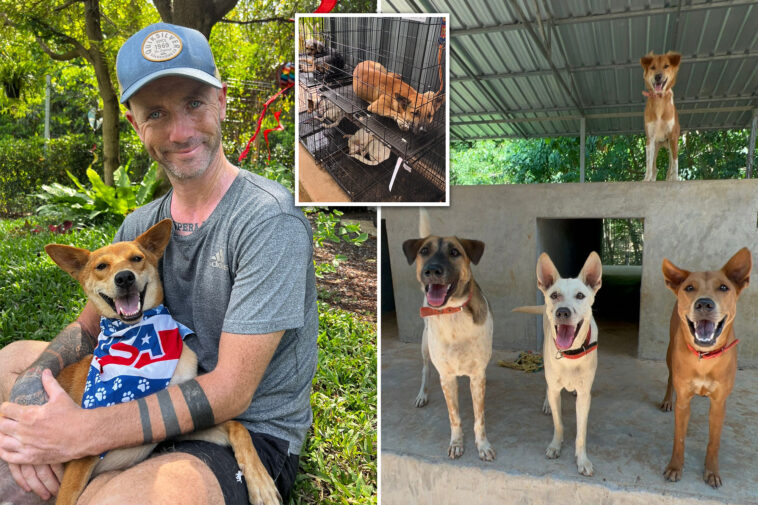Niall Harbison was on the edge of death, alone, in an ICU in Thailand after consuming massive quantities of alcohol and Valium in 2020, when he made a deal with himself.
“I just said … I’ve got to do something meaningful in my life,” he told The Post.
“I was, like, 41, miserable, and ended up in the emergency room,” said Harbison, who left a successful career as a social media entrepreneur and private chef in Dublin and relocated to Southeast Asia permanently.
Harbison, now 46, begged for another lease on life — pledging that he would not let it go to waste.
“If I survive, I’m gonna do something that actually makes a difference in the world, and I’d always loved dogs, so I just started feeding street dogs,” he recalled.
Five years later, Harbison has come a long way. The short videos that he has posted online showing him feeding dogs quickly went viral — with social media users from around the world offering to help.
“I definitely didn’t expect it to turn into something this big,” he said from his home on the island of Koh Samui — a popular tourist destination 300 miles south of Bangkok.
With more than 1 million followers across Instagram, X and TikTok, Harbison has built a nonprofit, Happy Doggo, which is devoted to reducing the stray dog population globally while educating humans on best practices to keep the pooches safe and happy.
Each morning before sunrise, Harbison hops on his moped and heads out to feed the street dogs scattered across Koh Samui.
My little family seeing me off to work for the day to go and help their less fortunate friends on the streets.
Hank is feeling much better and put on Tina’s old Bandana to celebrate.
We wish you a lovely Friday ❤️ pic.twitter.com/9CWS4ksYRD
— Niall Harbison (@NiallHarbison) October 24, 2025
“I feed 100 street dogs. I do that at 7 a.m. on my moped,” he said. “Before it gets hot or busy.”
But no day goes according to plan.
“A dog could have been hit by a car, six puppies could be dumped by the side of the road, there could be a dog that’s been shot,” he said.
“From then on, the day, really, anything can happen.”
The chaos is constant.
“It’s insane. I mean, there’s no day that’s the same,” Harbison said.
“Normally, I’ll have plans to catch up on admin or something, but we’ll get dogs from 8 in the morning … we could really be anywhere.”
I spotted him out of the corner of my eye last night.
While the team operated on 5 dogs today and saved several lives this was the one that felt super gratifying to me! Instant change in his quality of life! pic.twitter.com/93kERezMZC
— Niall Harbison (@NiallHarbison) October 23, 2025
The work can be brutal. Harbison, who has been open about his suffering from bouts of depression, said some days leave him emotionally exhausted.
“I’m just struggling here. It’s Friday evening here, and I’m struggling. We saw some bad stuff this week,” he revealed.
Several of Harbison’s rescues have been victims of violence, including one dog that was stabbed several times in the stomach and another that suffered gunshot wounds.
“It’s very, very emotionally draining. There’s times where I can’t. It gets the better of me, and I have to just, like, lay down in a dark room for an hour,” he said.
Harbison keeps moving, he said, because no one else will.
“The only thing that keeps me going is the dogs. They’ve got nobody to count on, so you’ve got to help them and try and move on to the next one.”
That resolve has been tested more than once. Harbison has twice been confronted by locals while feeding dogs — once by a man with a knife, another time by someone who appeared to have a gun.
The violence, he said, stems less from malice than from culture and survival.
“It’s a societal problem rather than one guy with an anger-management issue.”
“These guys will be chicken farmers or have buffalo, and suddenly a bunch of stray dogs will come along that maybe eat one of their chickens. The rule of the land is you can kind of shoot the dog.”
Instead of meeting anger with anger, he tries to model something else.
“I could just be angry at the people who’ve shot the dog,” Harbison said.
“A white person being angry is not really gonna change much. I have to change the whole culture through kindness, and community building and education.”
Harbison now oversees a full-scale rescue operation with a team of 22 employees — cooks, medics and field staff who care for the 1,200 dogs fed daily by Happy Doggo.
“We have, like, a hospital now, and we are trying to build a mobile clinic,” he said. Harbison’s aim is to expand the campaign of sterilization to bring down the number of street dogs while at the same time educating locals on how best to care for the canines.
“Next year is where the big growth comes. We’re gonna go to 40 or 50 [staff], because we’re building these mobile clinics,” he said.
To help fund the expansion, Harbison has turned his attention to an unlikely challenge — running the Bangkok Marathon with just a month to prepare.
“We were having a meeting and it was like, ‘Oh, we need to raise this money,’” he said.
“And I was like, ‘OK, f–k it, I’ll do the marathon.’”
He originally planned to train for over six months, but kept putting it off.
Harbison said the race will raise money for new mobile veterinary clinics — vans equipped to travel into rural Thai communities where stray dogs are often shot or abandoned.
The marathon, he added, is also personal.
“So I’ve only got 30 days’ training, so it’s gonna be even tougher than a normal marathon — but it’s for the dogs,” Harbison said.
The run, he explained, is part of something bigger. Beyond the fundraiser, he’s chasing what he calls a lifelong mission: cutting the world’s 500 million street dogs in half.
To get there, he relies on three pillars — sterilization, education and legislation — the framework he believes can turn small rescues into lasting change.
“I can do a bit on the ground and raise some money and get people involved,” Harbison said.
“But I know that I need to get governments to change. They’re the ones who can make the real difference.”













